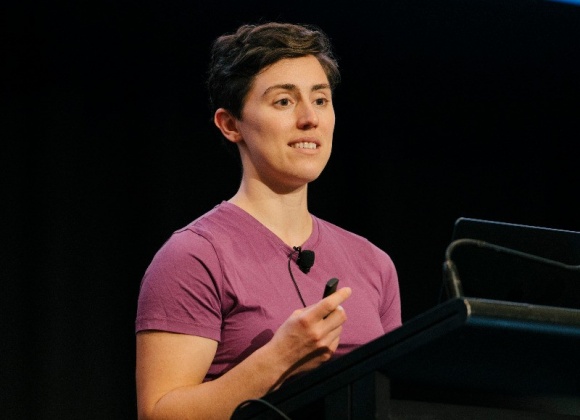In this podcast Charles Humble and Wes Reisz talk about autonomous vehicles, GDPR, quantum computing, microservices, AR/VR and more.
Key Takeaways
- Waymo vehicles are now allowed to be on the road in California running fully autonomous; they seem to be a long way ahead in terms of the number of autonomous miles they’ve driven, but there are something like 60 other companies in California approved to test autonomous vehicles.
- It seems reasonable to assume that considerably more regulation around privacy will appear over the next few years, as governments and regulators grapple with not only social media but also who owns the data from technology like AR glasses or self-driving cars.
- We’ve seen a huge amount of interest in the ethical implications of technology this year, with Uber getting into some regulatory trouble, and Facebook being co-opted by foreign governments for nefarious purposes. As software becomes more and more pervasive in people's lives the ethical impact of what we all do becomes more and more profound.
- Researchers from IBM, the University of Waterloo, Canada, and the Technical University of Munich, Germany, have proved theoretically that quantum computers can solve certain problems faster than classical computers.
- We’re also seeing a lot of interest around human computer interaction - AR, VR, voice, neural interfaces. We had a presentation at QCon San Francisco from CTRL-labs, who are working on neural interfaces - in this case interpreting nerve signals - and they have working prototypes. Much like touch this could open up computing to another whole group of people.
Subscribe on:
Show Notes
- 02:28 Reisz: How do you keep your pulse on software?
- 02:31 Humble: One of the main methods I use to keep abreast of technology trends is through the software practitioners and news writers who contribute to InfoQ.com, both through their writing and when we meet at QCon conferences throughout the year. In addition to participating in the planning of some of the QCons, I attend developer meetups and other conferences.
- 03:43 Reisz: You're hosting the Architectures You've Always Wondered About track at QCon London in March. What are some of the talks you have in there, so far?
- 03:49 Humble: The BBC is coming to talk about iPlayer, their catch-up service in the UK. A couple years ago, they talked about their microservices journey and moving to AWS. I'm hoping to get them to talk about the iPlayer client, written entirely in Javascript, and it's a fascinating story.
- 04:21 We've got AirBnb coming, talking about their microservices journey and their experience running microservices in production.
- 04:34 John Graham-Cumming from Cloudflare will be talking about Cloudflare Workers, their Javascript-based, serverless execution environment.
- 04:48 There are a few others that aren't quite confirmed yet, so I can't discuss them, but it's shaping up quite well. I'd like to get one more UK or London company, and maybe a Bay Area/Silicon Valley company to round it out.
- 05:03 Reisz: One of the things that stood out for me in 2018 was the pervasiveness of AI and how it's affecting our lives now, and will be affecting our lives in the near future. One example is autonomous driving cars, and you can't really talk about that without mentioning the Uber accident last March. It shows there's lots of room for improvement here, but in 2016 there were approximately 34,000 deaths in North America alone from car accidents. Self-driving cars have a tremendous ability to make an impact on our daily lives.
- 05:48 Humble: I completely agree. The vast majority of accidents are caused by driver error, and eliminating that whole reason for accidents is a good thing. Ubiquitous autonomous vehicles are probably further away than many people imagine, but I do think that autonomy within certain constraints is still a big deal. There's still a way to go, but there's definitely a chance for these vehicles to save lives. There are also opportunities to help people with mobility issues, or live where there is a lack of public transportation. There will inevitably be accidents, but that shouldn't make us blind to the fact that cars are pretty lethal anyway, and autonomous vehicles have the ability to improve that in a significant way.
- 07:33 Reisz: Fully autonomous vehicles catch the major headlines, but it's going to augmenting people, especially in the short term. The human in the AI loop, where feedback allows the human to make better decisions.
- 07:58 Reisz: Waymo is now the first fully-autonomous car allowed to be on the roads in California, at least around Silicon Valley.
- 08:20 Humble: Waymo has done ten million autonomous miles, and a further seven billion simulated miles, since 2009. They seem to be a long way ahead in the amount of driving they have done, but there are about 60 other manufacturers that are approved to test autonomous vehicles in California. There is a lot of money and effort going on, just in the category of cars, but there is also work being done on trucks and drones.
- 09:19 Reisz: Another subject that's been in the news, especially in Europe, is GDPR.
- 09:29 Humble: GDPR is the General Data Protection Regulation, announced by the European Union in April 2016, and came into effect a couple years later. There were some high profile companies that weren't ready, including Pinterest's Instapaper, Unroll.me, and Stardust. It's a very complex piece of legislation, with the purpose of giving you the right to understand how your data is being used. We will need case law to understand how well it works in practice. It's part of a movement by governments all over the western world to tackle the business of consumer data and privacy. We've seen bills passed in California and Vermont, and I think we'll see more and more. Back to what we were just talking about, if you think the data that can be collected from social media records is a problem, imagine how much data we could collect from self-driving cars.
- 10:43 Reisz: Ford's CEO was recently interviewed, and discussed the analytics they are doing around automobile financing as well as driving characteristics. He said about 100 million people have Ford vehicles, and there's a huge case for monetizing those insights. If you add that to self-driving cars, it's amazing the kind of insights we could potentially find from people's habits.
- 11:19 Humble: I think we're at a cusp in our industry of seeing a large quantity of legislation. Because we've been slow to put our own house in order, such as around ethically implications of software, it's probably not a bad thing that legislators are starting to call attention to issue.
- 11:40 Humble: Something else that we've seen this year on InfoQ and at QCon was the ethical implications of technology. The broader point is, because software is becoming more ubiquitous in more people's lives, the impacts you have if you're working on software just become more profound. If one person throws litter out the car window, it doesn't really matter, but if everyone does it, pretty soon the whole world is covered in rubbish. It's the scale that is becoming interesting now.
- 12:45 Humble: In March, at QCon London, we had our ethics track, which was the first major conference that I know of that had an ethics track.
- 12:56 Reisz: As far as I know, that's true. Ann Curry spun up a follow-on conference on ethics after that, but it was following QCon London.
- 13:20 Reisz: There was some news recently about Red Hat that I know you wanted to talk about.
- 13:24 Humble: Essentially IBM is acquiring Red Hat. Other than Oracle, IBM and Red Hat are two of the largest contributors to the Java platform. One thing that seems likely is that IBM will reduce the total number of people allocated to supporting Java. I also think it's interesting in the general context of public clouds, because I think it's something we can expect to see a bit more of in the next two or three years. Mergers and acquisitions in the cloud space are quite likely to happen. I wouldn't be surprised if Oracle we to acquire somebody, or they could exit the public cloud business altogether. I have the sense that their cloud offering isn't gaining enough traction in the market, and we've had some other companies exit the market (AT&T, Cisco, the former Hewlett-Packard), so there's precedence.
- 14:22 Humble: I could be really contentious and say it's quite interesting to see what Google does. Obviously, Google is one of the big players in the cloud space, but they're quite a long way behind AWS, and they seem to be a long way behind Azure, as well. I wonder how much longer they will keep going. My guess is they will always have a bit of a niche with machine learning-type stuff, because of TensorFlow. Google almost invented the whole idea of cloud computing, and yet AWS, to me, seems to be very far ahead.
- 15:03 Reisz: Let's put a pin in 2018 and look at 2019. What do you see as the major trends going forward into the coming year?
- 15:12 Humble: One of the things we talked about briefly last year was quantum computing. It's still some way out, but it is still genuinely interesting.
- 15:22 Reisz: Before you go further, let's level set. What is into quantum computing?
- 15:29 Humble: It's very hard to describe in a small number of words. We published a series of articles by Holly Cummins of IBM (part one, part two, part three) which are brilliant, and are a much better explanation. Basically, quantum computers were purely theoretical twenty years ago, and they now exist. They exploit certain aspects of quantum mechanics. In particular superposition which has to do with spin and that an observed spin is in one of two states. The other bit has to do with shared properties of entanglement. You can observe one electron, and that tells you the state of the other electron, over long distances, up to 1.3km.
- 16:06 Humble: The key thing to understand is that quantum computers can deal with certain kinds of problems much faster or, in some cases, more effectively, than classical computers. In fact, we had a formal proof of that this year. You tend to hear it talked about a lot in the context of cryptography because we rely on asymmetric keys, and, in theory, quantum computers can break asymmetric keys, so we'll need new ways of securing stuff. But there are several categories of problems, including financial risk management, logistics, or medical research, which require high levels of computing power.
- 17:10 Humble: There are several companies exploring this space. IBM has their Q machines, which you can access via IBM's cloud, to run real experiments on real quantum computers. Google launched a Python open library called Cirq, and Microsoft has Q#.
- 17:45 Reisz: Are these all new languages to target quantum processors?
- 17:54 Humble: IBM has a Python library, as does Google. Python seems to be one of the languages being used, but Microsoft has created its own language in Q#. I don't know how that will go, but I suspect we will need new languages to describe what we're trying to do, and Python isn't a bad place to start. I think it's genuinely exciting that you can go to GitHub, download some code and then run it on real quantum computers in IBM's data centers. For corporations, it also means you don't have to invest in building and maintaining these complex machines, because you can just access them through the cloud.
- 19:44 Humble: What are some of the forward-looking things you've been thinking about? I know you've been thinking a lot about machine learning.
- 19:50 Reisz: What's old is new might be a good way of phrasing things. Back in 2016 Netflix talked about Open Connect, and how they worked with ISPs to stage these boxes all around the world. Most of the content being served to clients all around the world was via this CDN. This facilitated the Netflix Everywhere deployment when content was made simultaneously available to 190 countries.
- 20:42 Reisz: I see the pattern of pushing logic out to the edge and taking it off the cloud resources. That's particularly true for ML and AI. Mike Lee Williams of Cloudera, one of our committee members for QCon AI, released a report talking about federated machine learning. It ties some of the privacy concerns of GDPR into edge and machine learning. Federated learning allows you to use your phone or other IOT devices to run a machine learning algorithm using training data specific to that device, and then upload the model to a central server and then aggregate those models together.
- 21:51 Humble: So what does that mean and what are the benefits?
- 21:53 Reisz: It means taking some of the processing power off the centralized servers and pushing it down to edge devices. To handle the privacy implications, instead of uploading personal data, you keep the personal data local and only upload the trained model to the server.
- 22:18 There are some other interesting cases for edge computing outside machine learning. At QCon New York, Chick-Fil-A talked about what they're doing with edge computing. Statistica said by 2025 there are going to be 75 billion IOT devices connected to the internet. I think it's very compelling and forward-looking to start leveraging the edge, and being able to push machine learning and different functions down to those devices, and then aggregate them up.
- 23:03 Humble: We've known for a while that if you train models using big machines, that you can then push those models down to small devices to run them. Doing that the other way is really fascinating. The most recent Apple devices have a neural engine as part of the A12 chip, which is exactly for this idea of being able to run things and push it back up. In Apple's case, it's partly around privacy.
- 23:35 Humble: Something else we're seeing with machine learning, as we're putting the tooling into the hands of more developers, the applications we're seeing are really fascinating. We know about use cases with image processing, such as interpreting radiology scans. Some of the opportunities with wearables are also compelling, like being able to combine wearable health tech with machine learning. We're really just scratching the surface of what machine learning can do.
- 24:47 Humble: It would be remiss of us to not talk about microservices.
- 24:58 Reisz: Two or three years ago, when we talked about microservices at QCon, we were talking about how to decompose the monolith. Where do we set our bounded contexts? How do we decompose this thing into services? We were still asking, "What is 'micro' in a microservice?" Now I hear a lot more of the conversation being around how to operate microservices. How do we properly setup north-south and east-west communication among services? How do we properly secure things? How do we handle observability? When you get to a certain point with microservices, the discussion is now, "How do we enable this?"
- 25:42 Reisz: Kubernetes seems to have won the battle when it comes to orchestration. People are now building on top of Kubernetes as a given piece of infrastructure. We're seeing a lot of work with service meshes. If cloud removed the undifferentiated heavy lifting of building apps on infrastructure, I think service meshes are starting to remove the undifferentiated heavy lifting in writing applications. It does dynamic routing. It gives you resilience with circuit breakers. It provides a best-in-class observability experience. Some of the names we hear about in that space are Envoy, Hashicorp's Consul Connect, Bouyant's Linkerd 2, and Istio. One interesting one is Cilium, which works in the kernel space, instead of the user space.
- 27:50 Humble: We're also seeing some definite pushback against microservices.
- 27:53 Reisz: Microservices solve the specific problem of developer and deployment velocity, when people are stepping on each other's toes. If you're not having those problems, microservices may not be the right answer; monoliths are perfectly fine. You do hear counter-arguments from people now saying, "microservices were wrong for us."
- 28:26 Reisz: At our heart as developers are languages. What trends are you seeing for languages in 2019, and is there a language of choice?
- 28:39 Humble: Java isn't going anywhere. C# and .NET isn't going anywhere, either. There's still a tremendous amount of interest in those languages on InfoQ, and I think that will continue to be true. In terms of the other languages we're seeing interest in, Go is one. We had a popular piece recently about Go and microservices at The Economist. We also see a lot of interest in Rust. If you're doing anything that's performance-sensitive, Rust is a pretty good alternative to C++. I'm personally very interested in Swift. My ten-year-old is a big fan of the iPad, and he wants to learn Swift, so I've been learning it with him. Kotlin, on the JVM space, is similar to Swift because it's found its niche for doing mobile development. Python has also been growing really rapidly. It's not new, about the same age as Java, but it's really taking off, driven mostly by data science.
- 30:17 Reisz: I know you have an interest in augmented reality and virtual reality. What's coming up in 2019 with AR and VR?
- 30:29 Humble: In AR, we don't have the form factor, yet. I think it's likely to be eyeglasses, but I don't think anyone is quite ready with the tech. I don't think Apple gets enough credit for building really small computers. If you think of AirPods or the Apple Pencil, they are really discrete computing devices that we don't really think of as computers. That works well for the idea that if you're going to build an AR device, it has to be small and discrete. There's also the whole issue with privacy. We learned from Google Glass that you must have a strong privacy story if this stuff is going to work for you. I think we know where it's going, but we aren't there yet.
- 31:28 Humble: In more general terms, there's so much happening around human-computer interaction, with voice, AR, and neural interfaces. Adam Berenzweig from CTRL-labs gave a presentation at QCon San Francisco talking about their wrist device that picks up nerve signals. I think that's interesting because the same way that touch opened up computers to a class of people who couldn't use them before, neural interfaces may be able to do that for people for whom touch isn't an option. It can also be a benefit for everyday users who start to suffer from repetitive stress injuries, to allow alternative input options. That whole space is a long way out, but I find it all fascinating. In the same way we had the touchpad shift, I think there will be another shift coming.
Resources
- Holly Cummins articles on Quantum Computing (part one, part two, part three)
- Rethinking HCI with Neural Interfaces @CTRLlabsco



